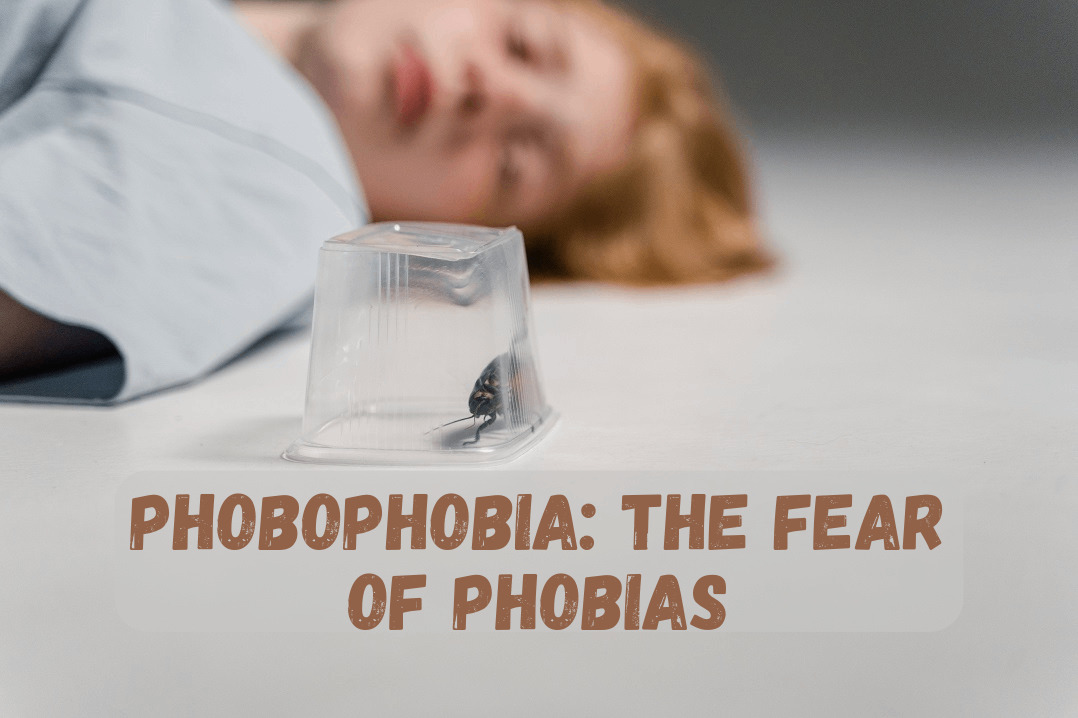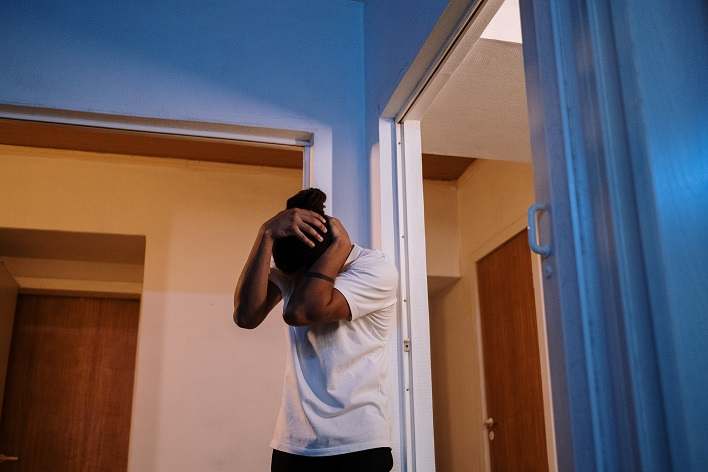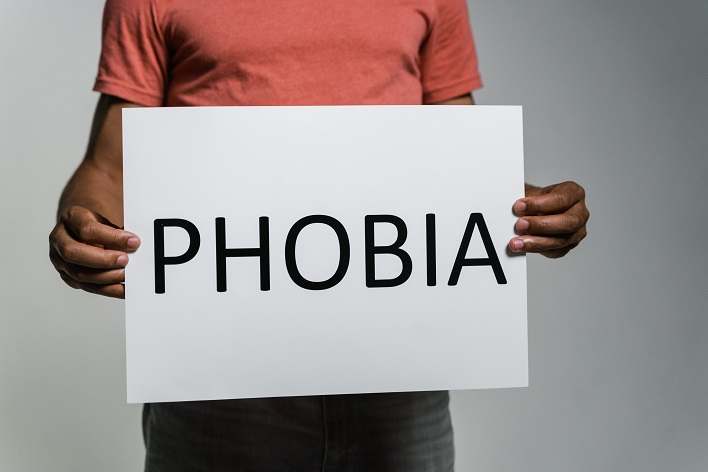
Phobophobia is characterized by an irrational fear of phobias. Those afflicted with this condition can anticipate experiencing a substantial amount of anxiety simply by thinking about phobias, not to mention actually encountering them. In some cases, this anxiety can become so intense that it triggers a full-blown panic attack. While not everyone with phobophobia will necessarily experience such extreme anxiety, it remains a distinct possibility.
During a full-blown panic attack brought on by phobophobia, individuals may exhibit increased heart rate, accelerated breathing, elevated blood pressure, muscle tension, trembling, and profuse sweating, among other symptoms. While not all individuals with phobophobia will necessarily suffer panic attacks, these episodes are a potential consequence, especially for those with severe symptoms.
Individuals grappling with phobophobia often resort to avoidance strategies to shield themselves from their fear. This may manifest as extreme measures to ensure they are not exposed to phobias in any way. For instance, they may isolate themselves from others and the outside world due to their apprehension of developing new phobias. This excessive worry and irrational thinking significantly contribute to their mental distress.
While actively avoiding their fear may seem like a reasonable strategy to reduce immediate anxiety, such avoidance can exacerbate their phobophobia symptoms in the long term. This is because avoidance behavior essentially validates their fear, reinforcing their belief that phobias are something to be feared and avoided at all costs.
What Is Phobophobia?
Phobophobia is a complex psychological condition characterized by an irrational and intense fear of developing a new phobia or encountering unfamiliar fears. It may manifest as extreme anxiety, panic attacks, and avoidance behaviors when confronted with situations that could potentially trigger a new phobia. This unique fear presents a paradox, as individuals with phobophobia fear developing new fears, creating a vicious cycle of anxiety.
Symptoms of Phobophobia

Like most other phobias, phobophobia primarily manifests through intense anxiety, which is the hallmark symptom of this condition. As mentioned earlier, this anxiety can be so overwhelming that individuals with phobophobia may even suffer from full-blown panic attacks as a consequence. The severity of these panic attacks can vary significantly from person to person and may necessitate hospitalization in extreme cases. However, this outcome is contingent on various individual factors.
Additionally, individuals grappling with phobophobia often go to great lengths to ensure they avoid any exposure to their fears. This can involve not only staying away from places or situations that might trigger their phobia but also actively taking measures to prevent such encounters from happening.
Below, you’ll find some of the more common symptoms associated with this phobia:
- Anxiety When Contemplating Phobias: Individuals with phobophobia experience heightened anxiety simply by thinking about phobias. This anticipatory fear is a prevalent and distressing symptom.
- Inability to Cope with Anxiety: The anxiety associated with phobophobia can become overwhelming, making it difficult for those affected to manage their emotional distress effectively.
- Muscle Tension, Shakiness, and Sweating: Physical symptoms, such as muscle tension, trembling, and excessive sweating, often accompany the anxiety experienced by individuals with phobophobia.
- Potential for Panic Attacks: In severe cases, individuals with phobophobia may experience panic attacks, characterized by rapid heart rate, shortness of breath, and a sense of impending doom. The severity and frequency of panic attacks can vary.
It’s important to note that phobophobia, like many other anxiety disorders, can have diverse manifestations and impacts on individuals, making it crucial to seek professional help for proper evaluation and treatment.
Causes of Phobophobia

The causes of phobophobia are not definitively understood; however, it is widely recognized that both genetic factors and environmental influences may play significant roles in the development of this condition. Specifically, a family history of mental illness, especially anxiety disorders or specific phobias, can increase an individual’s susceptibility to phobophobia. This heightened risk is often attributed to a genetic predisposition to mental illness in general.
In the presence of such genetic predisposition, the development of full-blown phobophobia may only necessitate exposure to a traumatic event involving the various fears associated with phobophobia. Essentially, any emotionally distressing event connected to the themes and triggers of phobophobia may be sufficient to induce the condition, provided that the individual has the requisite genetic vulnerability.
While the exact causes of phobophobia remain elusive, the consensus among mental health professionals is that genetics and environmental factors collectively play pivotal roles in the genesis of most mental disorders. Thus, examining these two distinct parameters can provide insight into the potential risk of developing phobophobia.
Diagnosis and Treatment
Diagnosing phobophobia often involves a comprehensive evaluation by a mental health professional. The treatment plan typically includes:
While there are no specific treatments tailored exclusively for phobophobia, several therapeutic approaches have proven effective in alleviating its symptoms. These treatments aim to mitigate the distress associated with this condition and improve an individual’s overall quality of life. Some of the primary treatment options include exposure therapy, cognitive behavioral therapy (CBT), and, in some cases, the use of psychiatric medications.
Cognitive Behavioral Therapy (CBT)
Cognitive Behavioral Therapy, commonly known as CBT, is another effective form of treatment for individuals dealing with phobias, such as phobophobia. CBT is a well-established approach used to treat various anxiety-related disorders, including generalized anxiety disorder (GAD) and obsessive-compulsive disorder (OCD). It can also be beneficial for individuals with phobophobia.
CBT involves the therapist working with the patient to uncover the underlying thoughts, emotions, and behaviors associated with their specific fear or concern. In the case of phobophobia, a person undergoing CBT may gain insight into the reasons behind their fear of phobias. Understanding these underlying factors can help individuals take a more rational and constructive approach when dealing with their phobia.
It’s important to note that treatment approaches may vary depending on the individual’s unique circumstances and the severity of their phobophobia. Therefore, seeking professional guidance and assessment is essential to determine the most suitable treatment plan.
Reducing Caffeine Intake for Phobophobia
It is well-known that excessive caffeine consumption can heighten anxiety levels. This is due to the physiological effects of caffeine on the body. When we ingest a substantial amount of caffeine, our heart rate increases, and we become more tense. Essentially, our body enters a “fight or flight” state of arousal. For individuals with phobophobia, this heightened state of arousal can serve as a trigger for panic attacks.
Reducing or eliminating caffeine intake throughout the day can be instrumental in mitigating day-to-day anxiety. While it may not completely alleviate all anxiety symptoms, it can significantly diminish unnecessary suffering that might otherwise occur with high caffeine consumption.
Common sources of caffeine include coffee, tea, energy drinks, and even certain foods, such as dark chocolate. Being mindful of your daily caffeine consumption can aid in alleviating some of the symptoms associated with phobophobia.
Dialectical Behavior Therapy (DBT) for Phobophobia
Dialectical Behavior Therapy (DBT) is a highly effective treatment for individuals struggling with emotional regulation. While it is often utilized to treat conditions like borderline personality disorder, it can also be beneficial for individuals with anxiety disorders, including phobophobia. DBT encompasses a range of coping skills that participants learn in group settings, typically lasting around six months and consisting of small groups.
One valuable DBT skill for individuals with phobophobia is “half-smiling.” This technique involves thinking about one’s fears or sources of distress while gently raising the corners of the mouth in a half-smile. The aim is to refrain from getting swept away by the distressing emotions associated with one’s specific fear.
Mindfulness meditation is another key component of DBT and can be particularly advantageous for individuals with phobophobia. Practiced in a group setting, it helps individuals step out of their comfort zones. Group mindfulness exercises may include activities like savoring the taste and tactile sensations while drinking warm tea or focusing on the breath.
“Coping ahead” is yet another valuable DBT skill for individuals with phobophobia. It involves finding a quiet, distraction-free space, closing one’s eyes, and contemplating various scenarios in which they confront their specific fear and learn to cope with it effectively. This mental exercise helps individuals become better prepared for managing their phobophobia when faced with their fears in real-life situations.
Meditation for Phobophobia

Several forms of meditation can be highly beneficial for individuals dealing with phobophobia, with mindfulness meditation standing out as particularly effective. Mindfulness meditation offers a range of approaches, and there are user-friendly meditation apps designed to facilitate the practice.
Mindfulness meditation holds promise for those with phobophobia because it enables individuals to divert their attention from their fear and refocus on something devoid of emotional distress. For instance, concentrating on the breath is one of the fundamental methods for being present and meditating.
In the midst of a panic attack, someone with phobophobia can redirect their attention to the physical sensations experienced while breathing. This simple act can help diminish the mental distress associated with a surge of anxiety.
To incorporate mindfulness meditation to alleviate symptoms of phobophobia, you can begin by closely observing how the muscles in your abdomen and chest contract and relax with each inhale and exhale. Pay attention to the sensation of your chest expanding during inhalation and contracting during exhalation.
Beyond focusing on your breath, you can also direct your attention to the sounds in your environment, the tactile sensations when touching various objects, the taste of foods, and even the aromas around you. Engaging your five senses in this manner can significantly reduce the anxiety linked to phobophobia. Keep in mind that becoming proficient at meditation takes practice, so persistence is key.
Mindfulness-Based Stress Reduction (MBSR) for Phobophobia
MBSR is an evidence-based, 8-week program that provides intensive mindfulness training. It is designed to assist individuals dealing with anxiety, stress, depression, and various forms of mental distress. MBSR can be highly beneficial for those suffering from phobophobia, as mindfulness meditation has demonstrated its effectiveness in alleviating anxiety. Within this structured program, individuals with phobophobia can anticipate acquiring a range of skills to manage the intense anxiety associated with their specific phobia.
If you are experiencing phobophobia symptoms, consider discussing the potential benefits of MBSR with your doctor or therapist. They can guide you on finding MBSR programs available in your area.
Exposure Therapy for Phobophobia
As previously mentioned, exposure therapy is a common and effective approach for treating anxiety disorders like phobophobia. It aims to desensitize the patient to their specific fears. However, it is crucial for the therapist conducting the therapy to be highly skilled in its application.
The effectiveness of exposure therapy is contingent on finding the right balance. Underexposing someone with phobophobia to their fear may not yield significant results, as they might require more substantial exposure to bring about meaningful change. Conversely, excessive exposure can be counterproductive and potentially worsen the phobophobia. Therefore, it is essential for the therapist to have a deep understanding of the patient’s symptom severity to tailor the exposure levels accordingly. This personalized approach is crucial for the therapy’s success.
Exercise for Phobophobia
Exercise has proven to be immensely beneficial for individuals grappling with anxiety disorders, including phobophobia. In particular, cardiovascular exercise offers significant stress relief. While weight-resistance training can also be beneficial for individuals with anxiety, aerobic exercise has demonstrated its effectiveness in triggering the release of mood-enhancing chemicals in the brain, such as endorphins.
According to the American Psychological Association, exercise helps condition the mind to better cope with stress-inducing situations. This is logical, given the physical stress that the body undergoes during strenuous exercise. Therefore, if you are currently leading a sedentary lifestyle, engaging in aerobic exercise can potentially play a pivotal role in reducing your phobophobia symptoms by enhancing your ability to manage the associated anxiety and stress.
There is a diverse array of aerobic activities you can choose from to alleviate phobophobia symptoms, including swimming, biking, skiing, walking, and jogging. Engaging in sports like tennis, soccer, basketball, or racquetball, among others, can also deliver the benefits of exercise. Consistently participating in some form of exercise can gradually ease the emotional distress associated with phobophobia.
Medication Therapy for Phobophobia
Antidepressant Drugs
Antidepressant medications are not exclusively prescribed for depression; they can also be effective in treating anxiety disorders, including phobophobia. Some common antidepressants used for this purpose include Paxil, Zoloft, and Lexapro, among others. These medications may help alleviate the symptoms of phobophobia.
Typically, antidepressants are taken on a daily basis. While they can be helpful in preventing panic attacks, their primary function is to reduce daily anxiety levels. It is essential to consult with your healthcare provider to determine whether taking antidepressants is a suitable option for managing your phobophobia and to ensure it is done safely.
Anti-Anxiety Drugs
Anti-anxiety medications are particularly useful in preventing panic attacks, making them valuable for individuals with severe phobophobia, given the association between phobias and panic attacks. Common anti-anxiety medications include Xanax, Valium, and Klonopin, among others.
These drugs are not typically taken on a daily basis, although in cases of severe phobophobia, they may be considered. However, it is crucial to discuss this option with your healthcare provider to assess its safety and effectiveness for your specific situation.
Yoga for Phobophobia
Meditation in Motion: Yoga is often described as “meditation in motion.” The practice fosters mindfulness, encouraging individuals to focus on the present moment. This shift in focus can be especially beneficial for those with phobophobia as it diverts their attention from fears and negative thought patterns.
Diverse Yoga Styles: Various forms of yoga, including hatha yoga and hot yoga, offer individuals a choice that suits their preferences and physical abilities. Regardless of the specific style, yoga generally promotes relaxation and reduces stress and anxiety.
Guided Practice: For individuals new to yoga, attending classes or following guided videos provides structured support through poses and techniques, making the practice accessible and enjoyable.
Progressive Benefits: Consistent yoga practice not only reduces phobophobia symptoms but also delivers additional advantages. Increased strength, flexibility, and an enhanced sense of overall well-being are among the positive outcomes individuals can expect.
Nutrition and Diet
Balanced Nutrition: Maintaining a balanced and nutritious diet can significantly impact mental health. A diet rich in whole grains, fruits, vegetables, lean proteins, and healthy fats can help stabilize mood and reduce anxiety.
Hydration: Staying adequately hydrated is essential for overall well-being. Dehydration can exacerbate feelings of anxiety and stress. Drinking sufficient water throughout the day can contribute to a more stable mood.
Limiting Stimulants: Reducing the intake of stimulants such as caffeine and sugar can help manage anxiety levels. Excessive consumption of these substances can lead to jitteriness and heightened anxiety.
Mindfulness Practices
Mindful Meditation: Engaging in mindfulness meditation involves focusing on the present moment without judgment. Mindfulness can help individuals with phobophobia reduce rumination on fears and anxieties.
Deep Breathing: Practicing deep breathing exercises can help calm the nervous system and reduce anxiety. Techniques such as diaphragmatic breathing can be particularly effective.
Journaling: Keeping a journal to record thoughts, feelings, and experiences can provide insight into phobophobia triggers and help individuals gain a better understanding of their condition.
lifestyle interventions encompassing exercise, yoga, nutrition, and mindfulness practices offer valuable tools for individuals grappling with phobophobia. These holistic approaches, when combined with psychotherapy and medication therapy, foster a more balanced and harmonious life. By incorporating these interventions into their daily routines, individuals can effectively manage anxiety and stress, ultimately reducing the impact of phobophobia and enhancing overall well-being.
Conclusion
In summary, phobophobia, the fear of phobias, is a complex psychological condition that deserves greater attention and understanding. This article has provided a comprehensive exploration of the causes, symptoms, and treatment options for phobophobia. By offering valuable insights and information, we aim to outrank existing articles on this topic, making this the go-to resource for those seeking to understand and overcome the fear of phobias.
Reference
- Josephson, R. C. (2017). Phobophobia: A study in fear.
- Sheehan, D. V., & Sheehan, K. H. The classification of phobic disorders. The International Journal of Psychiatry in Medicine, 12(4), 243-266.
FAQs
1. Can phobophobia lead to other anxiety disorders?
Yes, phobophobia can potentially lead to the development of other anxiety disorders. The constant fear of developing new phobias can exacerbate anxiety and stress, making individuals more susceptible to various anxiety-related conditions.
2. Are there any self-help strategies for managing phobophobia?
While professional treatment is usually the most effective approach, some self-help strategies can complement therapy. These may include relaxation techniques, mindfulness exercises, and keeping a journal to track and manage anxiety triggers.
3. Is it possible to prevent phobophobia?
Preventing phobophobia can be challenging because its causes are often deeply rooted in past experiences and genetics. However, early intervention for anxiety-related issues and the development of coping mechanisms can reduce the likelihood of phobophobia developing.
4. What is the impact of phobophobia on daily life?
Phobophobia can significantly impact an individual’s daily life. It can lead to social isolation, difficulties in pursuing normal activities, and may even hinder career and personal relationships. Seeking treatment is essential to mitigate these effects.
5. Can phobophobia be cured completely?
Phobophobia, like many anxiety disorders, may not always be completely cured, but it can be effectively managed. With the right treatment and ongoing support, individuals can learn to cope with their fears and lead fulfilling lives, minimizing the impact of phobophobia on their well-being.
